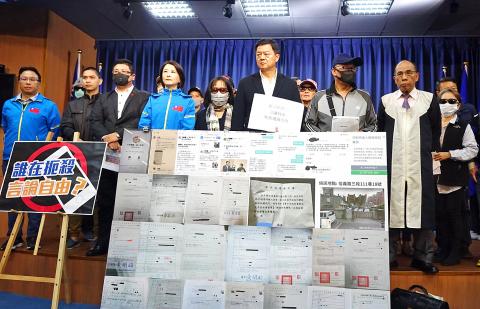The Chinese Nationalist Party (KMT) yesterday accused the Democratic Progressive Party (DPP) of silencing critics by having law enforcement agencies monitor people’s online activity and summon them for questioning.
“The government being allowed to curtail people’s freedom of speech and freedom of privacy of correspondence, both of which are guaranteed by the Constitution, is something unheard of,” former Taipei County commissioner Chou Hsi-wei (周錫瑋) told a news conference at the KMT headquarters in Taipei.
Chou is the deputy chief campaign officer for Kaohsiung Mayor Han Kuo-yu (韓國瑜), the KMT’s presidential candidate.

Photo: Wang Yi-sung, Taipei Times
“Some people were summoned by the Criminal Investigation Bureau, the Investigation Bureau and prosecutors just for sharing articles that were critical of the government,” Chou said, adding that some prosecutors allegedly told the people they summoned to “stop talking.”
He asked President Tsai Ing-wen (蔡英文) whether her administration had authorized prosecutors, investigators and police to intrude on people’s private conversations on instant messaging apps and social media.
Some district prosecutors reportedly overstepped their jurisdictions, summoning people from other cities or counties, Chou said, urging agencies to confess to the public if they had ordered prosecutors to target the DPP’s critics.
If Han is elected on Saturday, he would redress the injustices perpetrated against these people, Chou said.
There was a surge in similar cases from October to December last year, when many people had reported being summoned by prosecutors or police, KMT spokeswoman Wang Hong-wei (王鴻薇) said, calling such reports “green terror.”
Some people had said that they were summoned by more than one agency, she said, urging the Tsai administration to come clean about the agencies that had been giving prosecutors commands.
Police often say that they are short-staffed and leave many cases unattended, but they seem to be spending a lot of time investigating people before the elections, she added.
A woman from Kaohsiung said she had to appear in court later this month because she unwittingly shared a false news report.
Most ordinary people are not equipped to distinguish fake news, the woman said, adding that she had never thought that she would have to go to court one day because of a touch of her finger.
She asked why prosecutors had limited her freedom of speech, but have seemingly halted their investigations into a duty-free cigarette scandal that involved National Security Bureau officers.
A man said that a police officer showed up at his door with a snapshot of his Facebook page and asked him whether he had shared a news article and a video criticizing the DPP made by an Internet personality.
When he told the officer that he had, he was told he had breached the Social Order Maintenance Act (社會秩序維護法) and was taken to a police station to give a statement, even though he had shared the article, which contained erroneous information, in defense of the DPP administration, the man said.
He added that he suspected that his conversations on an instant messaging app had been monitored since the incident, as they sounded “echoey” even though neither speaker was on speakerphone.

Chinese Nationalist Party (KMT) Chairman Eric Chu (朱立倫), spokeswoman Yang Chih-yu (楊智伃) and Legislator Hsieh Lung-chieh (謝龍介) would be summoned by police for questioning for leading an illegal assembly on Thursday evening last week, Minister of the Interior Liu Shyh-fang (劉世芳) said today. The three KMT officials led an assembly outside the Taipei City Prosecutors’ Office, a restricted area where public assembly is not allowed, protesting the questioning of several KMT staff and searches of KMT headquarters and offices in a recall petition forgery case. Chu, Yang and Hsieh are all suspected of contravening the Assembly and Parade Act (集會遊行法) by holding

PRAISE: Japanese visitor Takashi Kubota said the Taiwanese temple architecture images showcased in the AI Art Gallery were the most impressive displays he saw Taiwan does not have an official pavilion at the World Expo in Osaka, Japan, because of its diplomatic predicament, but the government-backed Tech World pavilion is drawing interest with its unique recreations of works by Taiwanese artists. The pavilion features an artificial intelligence (AI)-based art gallery showcasing works of famous Taiwanese artists from the Japanese colonial period using innovative technologies. Among its main simulated displays are Eastern gouache paintings by Chen Chin (陳進), Lin Yu-shan (林玉山) and Kuo Hsueh-hu (郭雪湖), who were the three young Taiwanese painters selected for the East Asian Painting exhibition in 1927. Gouache is a water-based

Taiwan would welcome the return of Honduras as a diplomatic ally if its next president decides to make such a move, Minister of Foreign Affairs Lin Chia-lung (林佳龍) said yesterday. “Of course, we would welcome Honduras if they want to restore diplomatic ties with Taiwan after their elections,” Lin said at a meeting of the legislature’s Foreign Affairs and National Defense Committee, when asked to comment on statements made by two of the three Honduran presidential candidates during the presidential campaign in the Central American country. Taiwan is paying close attention to the region as a whole in the wake of a

OFF-TARGET: More than 30,000 participants were expected to take part in the Games next month, but only 6,550 foreign and 19,400 Taiwanese athletes have registered Taipei city councilors yesterday blasted the organizers of next month’s World Masters Games over sudden timetable and venue changes, which they said have caused thousands of participants to back out of the international sporting event, among other organizational issues. They also cited visa delays and political interference by China as reasons many foreign athletes are requesting refunds for the event, to be held from May 17 to 30. Jointly organized by the Taipei and New Taipei City governments, the games have been rocked by numerous controversies since preparations began in 2020. Taipei City Councilor Lin Yen-feng (林延鳳) said yesterday that new measures by